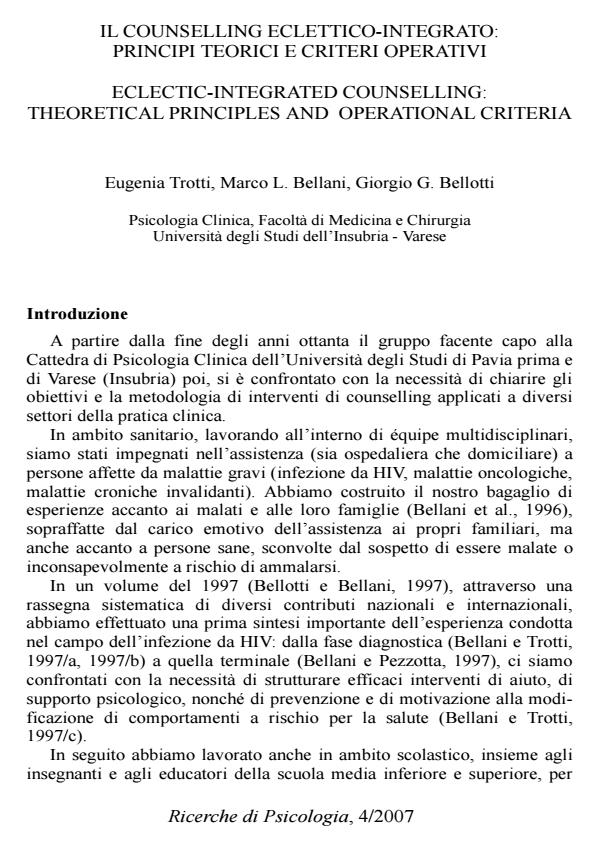Il counselling eclettico-integrato: principi teorici e criteri operativi
Titolo Rivista RICERCHE DI PSICOLOGIA
Autori/Curatori Eugenia Trotti, Marco L. Bellani, Giorgio G. Bellotti
Anno di pubblicazione 2008 Fascicolo 2007/4 Lingua Italiano
Numero pagine 26 P. 7-32 Dimensione file 421 KB
DOI
Il DOI è il codice a barre della proprietà intellettuale: per saperne di più
clicca qui
Qui sotto puoi vedere in anteprima la prima pagina di questo articolo.
Se questo articolo ti interessa, lo puoi acquistare (e scaricare in formato pdf) seguendo le facili indicazioni per acquistare il download credit. Acquista Download Credits per scaricare questo Articolo in formato PDF

FrancoAngeli è membro della Publishers International Linking Association, Inc (PILA)associazione indipendente e non profit per facilitare (attraverso i servizi tecnologici implementati da CrossRef.org) l’accesso degli studiosi ai contenuti digitali nelle pubblicazioni professionali e scientifiche
Il counselling eclettico-integrato: principi teorici e criteri operativi Since the late eighties, our group has had difficulty in clarifying counselling goals and methodology when applied to different sectors within clinical practice (health systems, schools, universities). These settings are somewhat varied, but they are all characterised by the need to provide help, via a clinical interview, to those who find themselves in a difficult situation, for whatever reason. This help needs to be concrete, specific and personalised, concentrated into a brief time frame and shaped by, and linked to, the demands of a practical, organisational, health-related or financial nature. The work here presented summarises a long period of reflection and review which has led to the definition of the theoretical principles and working criteria of a counselling model that we wanted to define as ‘eclectic-integrated’. ‘Eclectic’ since it refers to multiple theoretical influences and ‘integrated’ because it considers the person globally and aims to facilitate the re-activation of all the resources available, both personal and social. Furthermore, it is based on the counsellor’s capacities to guarantee an effective and prompt response to the user’s needs and to activate team work and to co-ordinate the various professional services and people involved. The eclectic-integrated approach offers workers in the social, health and educational sectors a flexible and dynamic work tool which is easy to adapt to the complexity of the situations which have to be tackled. It is well-structured and, at the same time, sufficiently elastic in its theoretical bases to allow for a good level of communication and pragmatic comparison between workers who have different training backgrounds and theoretical reference models. After a brief historical review of the origins of counselling and a presentation of the basic theoretical influences that the eclectic-integrated approach refers to, the work here presented tackles the methodological aspects, outlining the roles of the client and the counsellor and summarising the fundamental principles, the characteristics and the general goals of counselling. We then illustrate, in detail, the working strategies which, according to the specific objectives of each individual counselling session, determine the counsellor’s actions. The internal process that takes shape during counselling is described by means of a flow chart which proves useful when orienting the organisational services. The standard structure of a counselling session is also illustrated in its three stages: initial, intermediate and final. Each stage is defined on the basis of three components: the report, the content and the action. Furthermore, some indicators are suggested, regarding both the process and the result, not to be definitive as such, but with the aim of opening up dialogue between professionals about checking the effectiveness of counselling sessions.;
Eugenia Trotti, Marco L. Bellani, Giorgio G. Bellotti, Il counselling eclettico-integrato: principi teorici e criteri operativi in "RICERCHE DI PSICOLOGIA " 4/2007, pp 7-32, DOI: